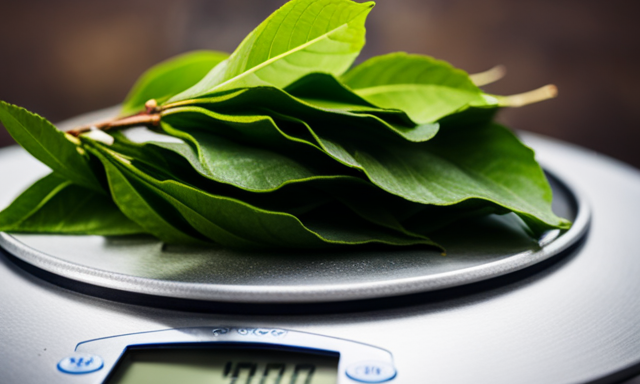Imagine depending on a crutch for your everyday tasks, and then abruptly, that support is removed. This was my experience when I chose to cease using herbal laxative tea for my digestive help.
It had become a habit, a dependency even, and I knew it was time to break free and find a more sustainable solution. But where to begin? How could I ensure a smooth transition without experiencing discomfort or setbacks?
In my quest for answers, I discovered that the key lies in nourishing my body with the right foods. By increasing fiber intake, staying hydrated, and incorporating healthy fats, I can support my digestive system in a natural and sustainable way.
Additionally, consuming probiotic-rich foods and practicing mindful eating can further enhance gut health. And of course, regular exercise and seeking professional advice are crucial components of this journey.
Join me as we embark on a new chapter of digestive wellness, free from the reliance on herbal laxative tea.
Key Takeaways
- Increase fiber intake by incorporating whole grains, fruits, vegetables, legumes, and nuts into your diet to support healthy digestion and regular bowel movements.
- Include healthy fats like avocados, olive oil, and nuts in your diet to aid in digestion, promote satiety, and support overall health.
- Focus on consuming probiotic-rich foods like yogurt and fermented vegetables, or consider a probiotic supplement, to enhance gut health and support digestion.
- Practice mindful eating by slowing down, using smaller plates, listening to your body’s hunger and fullness cues, and avoiding distractions to avoid overeating and promote digestion.
Increase Fiber Intake
Boost your fiber intake to support healthy digestion and promote regular bowel movements when you cut out herbal laxative tea from your diet. Increasing your fiber intake can help prevent constipation and maintain bowel regularity.
Focus on incorporating whole grains, fruits, vegetables, legumes, and nuts into your meals and snacks. These foods are rich in fiber and provide essential nutrients for overall health. Additionally, incorporating healthy fats, such as avocados, olive oil, and nuts, can aid in digestion and promote satiety.
Aim for at least 25-30 grams of fiber per day, gradually increasing your intake to avoid digestive discomfort. Remember to drink plenty of water to soften your stools and facilitate their passage. Staying hydrated is crucial for overall digestive health.
Stay Hydrated
When it comes to staying hydrated, I make sure to drink plenty of water throughout the day. Not only does water help with digestion and overall bodily function, but it also helps to prevent constipation.
I also try to limit my consumption of dehydrating beverages, such as alcohol and caffeine, as they can contribute to dehydration.
Drink plenty of water throughout the day
Make sure to hydrate yourself throughout the day by drinking plenty of water, as it’ll help maintain a healthy digestive system when you give up your herbal laxative tea. Increasing your water intake is essential to keep your body hydrated and support regular bowel movements.
Water helps soften the stool, making it easier to pass, and prevents constipation. Aim to drink at least eight glasses of water per day, and consider carrying a water bottle with you to remind yourself to stay hydrated.
In addition to water, incorporating high fiber foods into your diet can also promote healthy digestion. Foods such as fruits, vegetables, whole grains, and legumes are excellent sources of fiber. These foods add bulk to your stool, making it easier to pass and preventing constipation.
Remember to limit consumption of dehydrating beverages, such as alcohol and caffeine, as they can have a negative impact on your digestive system.
Limit consumption of dehydrating beverages, such as alcohol and caffeine
To keep your body properly hydrated, you’ll want to cut back on the consumption of dehydrating beverages like alcohol and caffeine. These beverages can have a detrimental effect on your digestive system because they act as diuretics, increasing urine production and leading to dehydration. This can further exacerbate the digestive issues you may be experiencing after stopping the use of herbal laxative tea.
Instead, opt for alternative beverages that can help keep you hydrated without depleting your body of fluids. Good options include water, herbal teas, infused water with fruits or herbs, and coconut water. These choices provide hydration while also offering additional nutrients and antioxidants.
By limiting alcohol and caffeine consumption and choosing healthier alternatives, you can support your digestive system and overall well-being.
Now, let’s move on to incorporating healthy fats into your diet.
Incorporate Healthy Fats
Incorporate healthy fats into your diet to nourish your body and uplift your spirits. Healthy fats play a crucial role in weight loss and overall health. Here are three examples of healthy fats you can include in your diet:
- Avocados: Rich in monounsaturated fats, avocados provide a creamy texture and a dose of healthy fats that can help you feel satisfied and full.
- Nuts and seeds: These’re packed with omega-3 fatty acids, which’ve been shown to reduce inflammation and support brain health.
- Olive oil: A staple of the Mediterranean diet, olive oil’s high in monounsaturated fats and’s been linked to a lower risk of heart disease.
By incorporating these healthy fats into your diet, you can support your weight loss goals while nourishing your body.
Next, we’ll discuss the importance of incorporating probiotic-rich foods into your diet for gut health and overall well-being.
Eat Probiotic-Rich Foods
When I stopped using herbal laxative tea, I made sure to incorporate probiotic-rich foods into my diet. I started consuming foods like yogurt and fermented vegetables, which naturally contain beneficial probiotics. I also considered taking a probiotic supplement to further support my gut health.
Consume foods that contain natural probiotics, such as yogurt and fermented vegetables
Try adding yogurt and fermented vegetables to your diet to boost your gut health and replenish beneficial bacteria after stopping the use of herbal laxative tea. Probiotics, found in these foods, have been shown to provide numerous benefits for gut health. They can help regulate digestion, reduce bloating, and strengthen the immune system.
When choosing a probiotic supplement, it’s important to look for one that contains a variety of strains, as different strains offer different benefits. Additionally, opt for a supplement with a high colony-forming unit (CFU) count to ensure you’re getting enough beneficial bacteria. It’s also a good idea to consult with a healthcare professional to determine the right probiotic supplement for your specific needs.
Consider taking a probiotic supplement alongside incorporating probiotic-rich foods into your diet to further support your gut health.
Consider taking a probiotic supplement to support gut health
Consider adding a probiotic supplement to your routine to support your gut health and improve digestion. Ever wondered if a probiotic supplement could be the missing piece to your digestive puzzle? Probiotics are beneficial bacteria that can aid in maintaining a healthy balance in your gut and promote better digestion. They’ve been shown to alleviate symptoms of digestive disorders such as irritable bowel syndrome and improve overall gut health.
When choosing a probiotic supplement, it’s important to consider the strain and number of live cultures, as well as the specific benefits they offer for digestive health. Look for supplements that contain strains such as Lactobacillus and Bifidobacterium. These can help restore the natural balance of bacteria in your gut.
Transitioning into the next section, practicing mindful eating can further support your digestive health.
Practice Mindful Eating
When it comes to practicing mindful eating, I’ve learned the importance of slowing down while eating and chewing my food thoroughly. This allows me to fully enjoy my meals and also helps with digestion.
Additionally, paying attention to my hunger and fullness cues has been crucial in avoiding overeating. By listening to my body, I can better nourish it without overindulging.
Slow down while eating and chew food thoroughly
To improve your digestion and promote a healthier gut, remember to slow down and savor each bite, allowing your taste buds to fully experience the flavors and textures of your food. Increasing meal duration and practicing mindful chewing can have a positive impact on your overall digestive health. By taking the time to eat slowly, you give your body a chance to properly break down the food, making it easier to absorb nutrients and prevent discomfort. Mindful chewing also helps to activate the digestive enzymes in your saliva, aiding in the digestion process. This technique can reduce bloating, gas, and indigestion.
Furthermore, slowing down while eating allows your brain to register feelings of fullness, preventing overeating. Paying attention to hunger and fullness cues is crucial for maintaining a balanced diet and achieving your health goals.
Transitioning into the next section, it’s important to be mindful of these cues to avoid overeating.
Pay attention to hunger and fullness cues to avoid overeating
Being mindful of your hunger and fullness cues is essential in preventing overeating and maintaining a balanced diet. Mindful eating techniques can help you reconnect with your body’s natural hunger and fullness signals, allowing you to eat according to your body’s needs rather than external factors.
Here are four strategies you can incorporate into your daily routine to practice mindful eating and avoid overeating:
- Slow down: Take your time while eating, savor each bite, and chew your food thoroughly. This allows your brain to receive signals from your stomach that you’re getting full.
- Use smaller plates: Portion control is key to prevent overeating. By using smaller plates, you can trick your brain into thinking you’re eating more than you actually are.
- Listen to your body: Pay attention to how your body feels before, during, and after a meal. Stop eating when you feel comfortably full, even if there’s food left on your plate.
- Avoid distractions: Eating while distracted, such as watching TV or working on your computer, can lead to mindless overeating. Focus on your meal and enjoy the sensory experience of eating.
By incorporating these mindful eating techniques and portion control strategies into your diet, you can maintain a healthy and balanced approach to eating. Transitioning into the topic of exercise, regular physical activity is also crucial for overall wellness.
Exercise Regularly
Make sure you keep up with regular exercise, as it acts as a powerful fuel for your body, igniting the flame of your metabolism and propelling you towards your health goals like a well-oiled machine.
Engaging in a consistent exercise routine has numerous benefits for your overall well-being. Not only does it help you maintain a healthy weight, but it also strengthens your muscles and bones, improves your cardiovascular health, and boosts your mood. Regular physical activity can even reduce the risk of chronic diseases such as heart disease, diabetes, and certain types of cancer.
It is important to find activities that you enjoy and that fit into your lifestyle, whether it’s going for a jog, taking a dance class, or playing a team sport. Just remember to start slowly and gradually increase the intensity of your workouts.
As you embark on this new phase of your diet, incorporating regular exercise will support your body’s transition and help you achieve your health goals. Remember to seek professional advice to ensure you’re making the best choices for your individual needs.
Seek Professional Advice
Consulting with a healthcare professional will guide you towards the best course of action for your health journey, helping you navigate the path to optimal well-being.
When it comes to stopping the use of herbal laxative tea, seeking professional advice is crucial. A healthcare professional can provide you with personalized guidance based on your specific needs and conditions. They can help you develop a diet plan that suits your body’s requirements and ensures you’re getting the necessary nutrients without relying on laxative tea.
They may recommend dietary restrictions to promote regular bowel movements and prevent constipation. Additionally, they can address any concerns or questions you may have, giving you the confidence to make informed decisions about your diet and overall health.
Remember, professional guidance is essential to ensure a safe transition and maintain your well-being.
Frequently Asked Questions
Can I still have a cup of herbal tea after stopping the use of herbal laxative tea?
Yes, you can still enjoy a cup of herbal tea after stopping herbal laxative tea. Herbal tea has many benefits, including soothing digestion. Consider alternative remedies for constipation, such as increasing fiber intake and staying hydrated.
How long does it take for my digestive system to adjust after stopping the use of herbal laxative tea?
It typically takes a few weeks for the digestive system to adjust after stopping the use of herbal laxative tea. During this adjustment period, it is recommended to incorporate natural alternatives like increasing fiber intake and staying hydrated.
Are there any specific foods I should avoid when transitioning off herbal laxative tea?
When transitioning off herbal laxative tea, it’s important to avoid certain foods that may aggravate your digestive system, such as processed foods, spicy foods, and foods high in fat. Consider potential dietary changes to support a healthy digestive system.
Can I take over-the-counter laxatives if I still experience occasional constipation?
Yes, over-the-counter laxatives can be used as alternatives to herbal laxative tea if occasional constipation persists. However, it is recommended to explore natural remedies first and consult a healthcare professional for personalized advice.
Are there any potential side effects or risks associated with stopping the use of herbal laxative tea?
There may be potential risks and side effects associated with stopping the use of herbal laxative tea. The digestive system may need time to adjust. Specific foods and over-the-counter laxatives can help manage occasional constipation.
Conclusion
In conclusion, breaking up with herbal laxative tea can be challenging, but with the right diet, you can make a smooth transition. Remember to increase your fiber intake, stay hydrated, and incorporate healthy fats into your meals.
Don’t forget to add probiotic-rich foods to support your gut health and practice mindful eating. Regular exercise will also aid in digestion. If you need extra guidance, seeking professional advice is always a wise choice.
Embrace this new chapter and let your body thrive without the dependency on herbal laxatives. Your digestive system will thank you.










